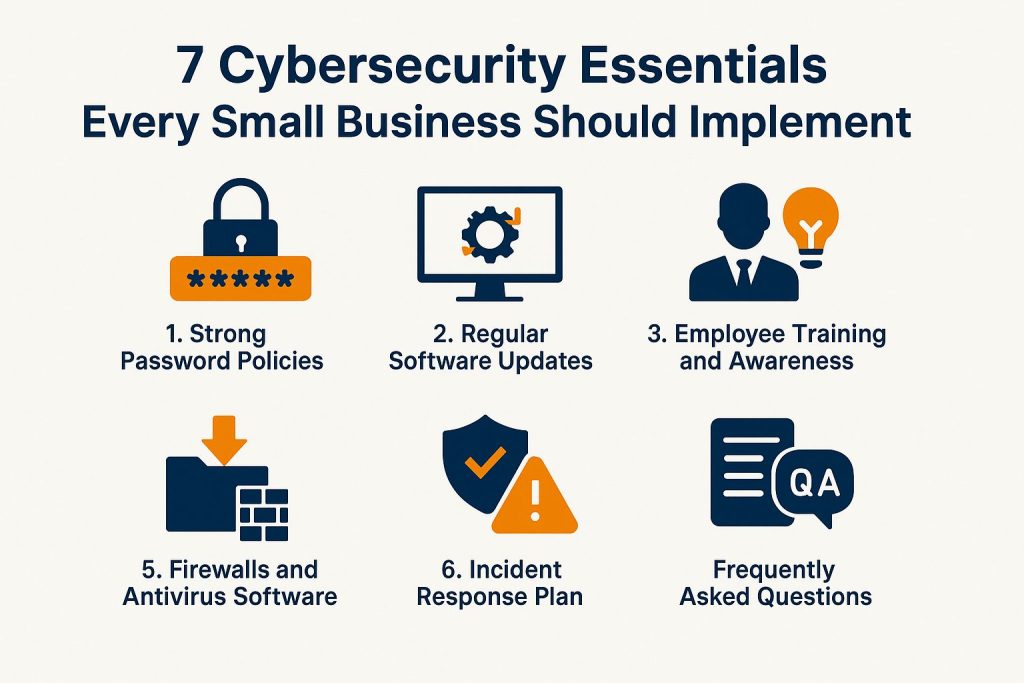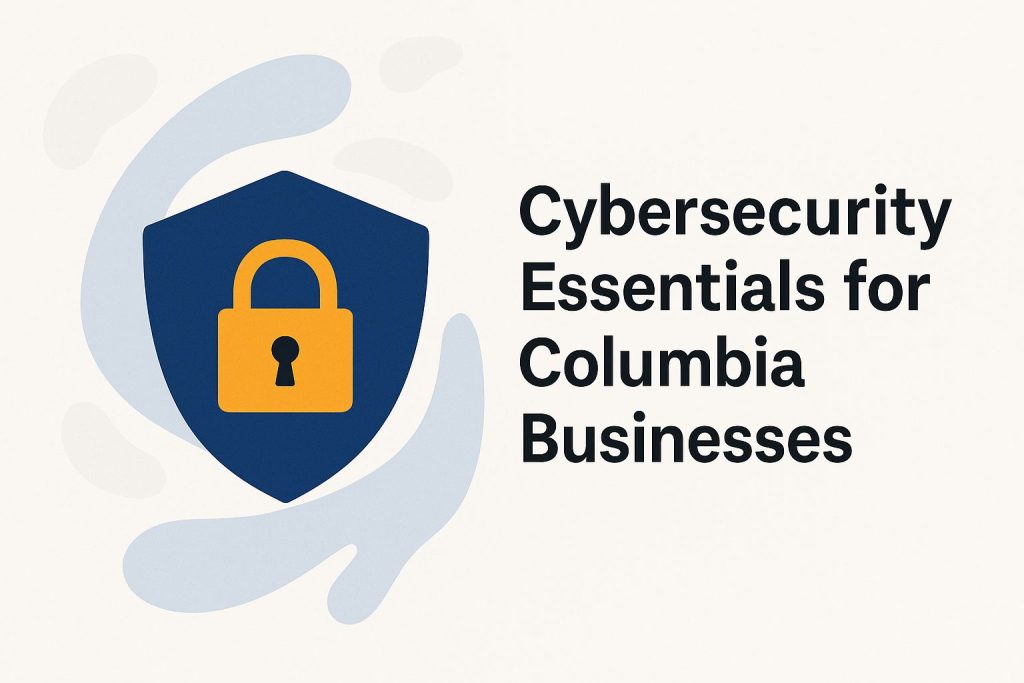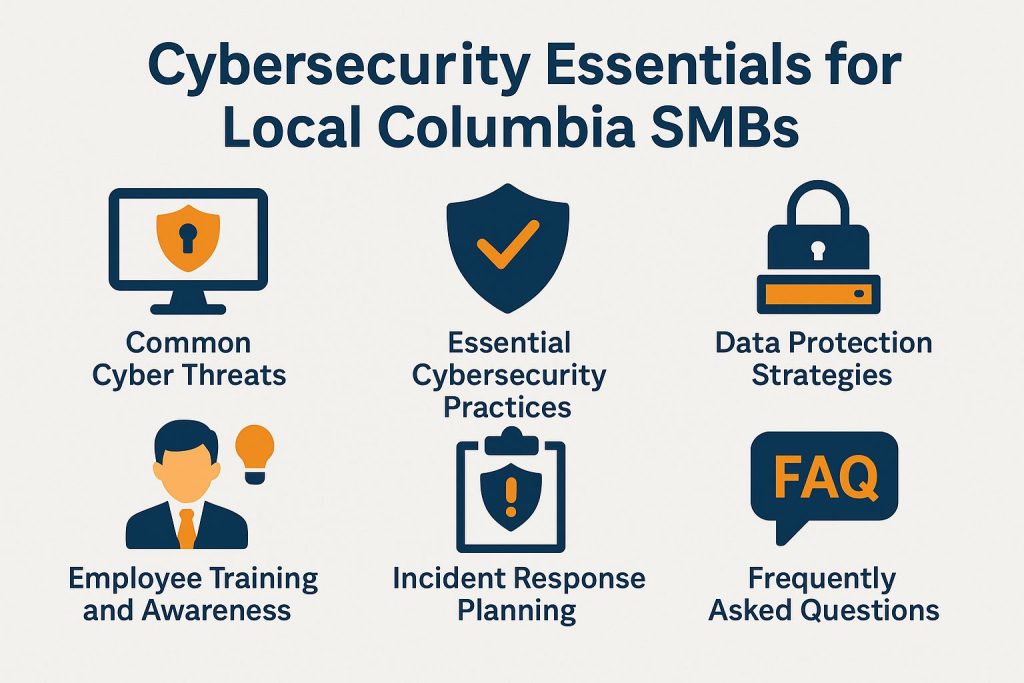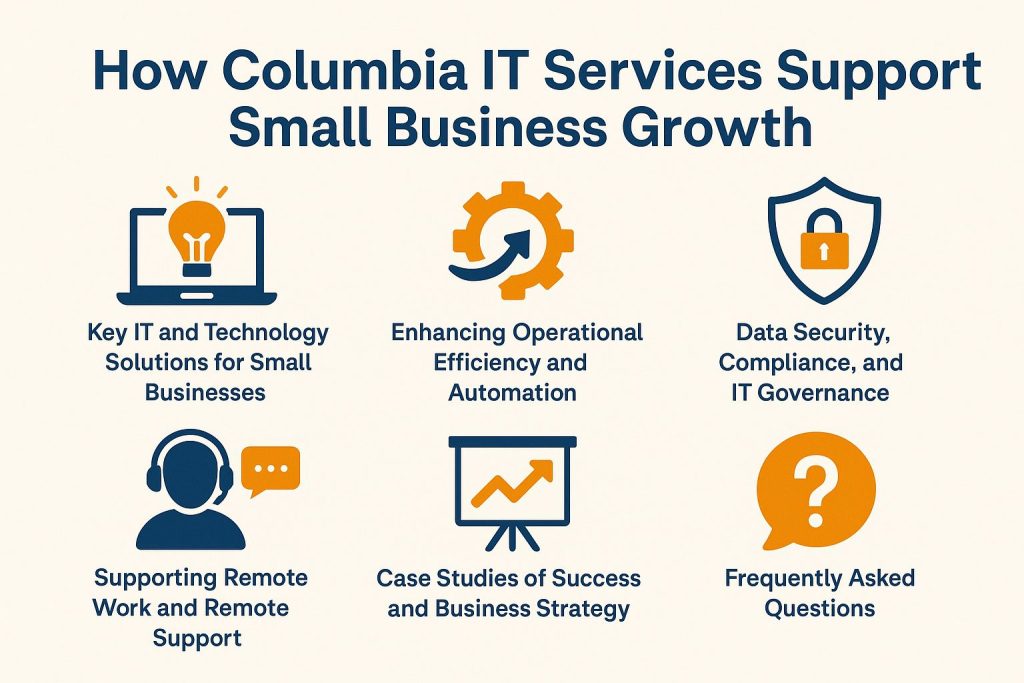7 Cybersecurity Essentials Every Small Business Should Implement

Cyber threats are becoming more sophisticated. Small businesses are vulnerable targets. A data breach can be very damaging, impacting both finances and reputation while emphasizing the importance of strong cybersecurity measures. To safeguard their operations, small enterprises must adopt essential cybersecurity measures and implement strong security protocols. This article delves into seven critical strategies, including strong password policies, regular software updates, and comprehensive employee training, that can significantly bolster their defenses against cyber threats and improve their overall cybersecurity strategy. Exploring these fundamentals is crucial for any small business aiming to thrive in a digital landscape.
1. Strong Password Policies
Strong password policies can reduce unauthorized access by 80%, thereby significantly enhancing the security posture of small businesses.
Creating Complex Passwords
Complex passwords typically incorporate a mix of uppercase letters, lowercase letters, numbers, and symbols, which makes them significantly more challenging to crack.
Use these steps to create a strong password:
- Opt for a minimum of 12 characters.
- Include a variety of character types, such as uppercase letters, lowercase letters, numbers, and special symbols.
- Avoid easily guessed sequences, such as “1234” or “password.”
- Utilize a password manager like LastPass or Bitwarden for efficient management and secure storage of passwords.
- Enable two-factor authentication (2FA) whenever possible to add an additional layer of security.
By using these strategies, individuals can significantly enhance their online safety and strengthen their cybersecurity resilience.
Implementing Two-Factor Authentication
Two-factor authentication (2FA) can effectively prevent 99.9% of automated cyber attacks, offering an essential layer of security that goes beyond traditional passwords.
Start implementing 2FA by choosing a reliable authentication app, such as Google Authenticator or Authy.
Next, enable 2FA on all important accounts, like email and banking.
Educate employees about 2FA. Explain its importance and usage to ensure compliance and minimize resistance. Any potential challenges, such as the initial inconvenience of remembering codes, should be addressed by highlighting the significant increase in security it provides against data breaches.
2. Regular Software Updates
Regular software updates are key to fixing vulnerabilities, conducting a vulnerability assessment, with 60% of breaches attributed to unpatched software flaws. To effectively manage updates, organizations should implement a structured schedule that includes monthly checks for all software, enabling automated updates whenever possible.
For desktop applications, utilizing a service like Patch My PC for just $5 per month can streamline patch management effectively. It is crucial to prioritize critical systems, such as firewalls and antivirus software, for more frequent reviews.
For instance, one company delayed its antivirus update by one week and faced a breach due to the exploitation of an outdated vulnerability. By establishing a proactive update routine, organizations can significantly reduce their risk of becoming victims of cyber threats. As mentioned, this proactive approach aligns with understanding the top cybersecurity threats in Columbia and how businesses can prevent them.
3. Employee Training and Awareness
Training employees can cut security incidents by 70%, as informed employees are less likely to succumb to common threats.
Conduct training sessions quarterly to keep security awareness high.
Utilizing platforms such as KnowBe4, which offers comprehensive training modules and realistic phishing simulations, can be an effective strategy, with packages starting at $1,200 per year for up to ten users.
After each training session, assess understanding with quizzes to reinforce the knowledge gained. Organizations should also develop an incident response plan and involve employees in tabletop exercises to simulate real-world scenarios.
This multi-pronged approach not only educates employees through security training but also empowers them to recognize and report potential threats effectively.
4. Data Backup Solutions
Data backup solutions are essential for business continuity. Many businesses fail after data loss. Statistics show that 30% fail.
To safeguard their data, organizations should consider implementing several strategies.
- Firstly, utilizing automated cloud backup services like Backblaze, which costs $6 per month, provides unlimited backups with minimal effort required.
- Additionally, adopting the 3-2-1 rule is advisable: maintain three copies of data, save them on two different media types, and store one copy offsite.
- Establishing daily backups is also crucial; this takes less than an hour to set up but can protect a business from catastrophic data loss (related insight: Benefits of Remote Tech Support for Growing Businesses).
5. Firewalls and Antivirus Software
Firewalls and antivirus software are essential. Research shows that 90% of malware attacks exploit network weaknesses, highlighting the importance of robust network security strategies.
To enhance cybersecurity, organizations should consider adopting a multi-layered approach.
Start with a good firewall like ZoneAlarm. It offers real-time protection and detects intrusions. This should be complemented by a robust antivirus solution like Norton 360, recognized for its comprehensive malware protection and frequent updates.
Organizations should ensure that firewall rules are reviewed quarterly; this practice is crucial for adapting to emerging threats and securing the network effectively.
Additionally, educating employees about phishing attacks and promoting safe browsing habits will significantly strengthen the overall defense against cyber threats and enhance their cyber hygiene practices.
6. Incident Response Plan
An effective incident response plan has the potential to reduce the cost of a data breach by as much as $1.23 million, facilitating prompt action and recovery.
To create a strong incident response plan, organizations should first identify critical assets, such as sensitive customer data and intellectual property.
Next, establish a dedicated response team. Clearly define the roles of each member, including cybersecurity experts and public relations personnel.
Develop communication protocols for internal notifications and public messaging. This ensures clarity during a crisis. Conduct regular drills at least every three months to test the plan and make adjustments.
This proactive approach fosters a culture of preparedness and enhances the organization’s resilience against potential threats. Worth exploring: Effective IT Disaster Recovery Planning for Business Resilience.
Frequently Asked Questions
What are the 7 cybersecurity essentials every small business should implement?
The seven essentials are: firewalls, antivirus software, data backup, secure networks, strong passwords, employee education, and regular updates.
Why is it important for small businesses to implement these cybersecurity essentials?
Small businesses are often targeted by cybercriminals due to their lack of resources and security measures. Implementing these essentials helps small businesses protect sensitive data and prevent cyber attacks.
What is a firewall and why is it important for small businesses?
A firewall is a security system that monitors and controls incoming and outgoing network traffic. It is the first line of defense against cyber attacks. It protects small businesses from unauthorized access to their network.
How does antivirus software help with cybersecurity for small businesses?
Antivirus software scans and removes any malicious software or viruses that can potentially compromise a small business’s network and data. By regularly updating and running antivirus software, small businesses can prevent data breaches and other cyber attacks.
What should small businesses consider when creating a secure network?
Small businesses should consider using a virtual private network (VPN) to secure their network and encrypt data, as well as implementing secure Wi-Fi and network access controls. It is also important to regularly monitor network activity and have a disaster recovery plan in place.
How can small businesses ensure their employees are educated on cybersecurity?
Small businesses should provide regular training and education on cybersecurity best practices for their employees. This can include topics such as how to identify and report suspicious emails or links, password management, and safe internet browsing habits.




